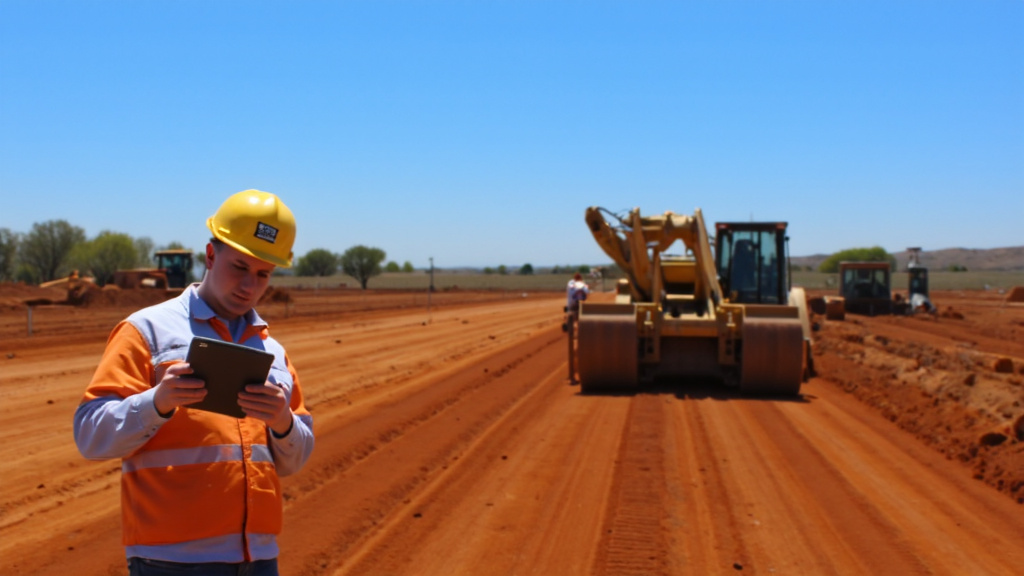Starting a new construction project in Texas requires careful financial planning, especially for site preparation. EB3 Construction’s experience in the Texas construction sector shows that preparation costs vary significantly based on site conditions and project demands. Understanding these cost factors helps developers and property owners create more accurate budgets before mobilizing equipment.
Site Preparation Costs for Texas Construction Projects

Land Clearing and Excavation
When analyzing clearing costs for Texas properties, we typically see pricing between $1,500 and $5,000 for basic clearing operations. This range shifts significantly for heavily wooded parcels, where tree density and size drive costs higher. Properties with mature oak or pecan trees, common in Central Texas, require specialized equipment and disposal solutions.
The excavation phase is another significant investment, with most projects requiring between $1,200 and $4,000 for soil excavation and removal. Costs increase substantially when the project involves basement excavation or extensive material disposal. Currently, equipment operator rates in Texas average around $190 per hour, reflecting the specialized skills needed for precision excavation work.
For larger commercial developments, these figures can multiply quickly. One recent project in the Houston area showed how per-acre costs for stump and tree removal can reach $500 to $2,000, depending on vegetation density and access challenges.
Grading and Site Leveling
Proper grading establishes the foundation for everything that follows, making it a critical investment rather than an optional expense. On average, we budget between $950 and $2,500 for standard grading operations in Texas. This range reflects the variation in topography across the state, from relatively flat coastal areas to the more challenging Hill Country terrain.
For landscape grading, equipment and operator costs typically run approximately $88 per hour according to statewide contractor data. Projects with significant slope adjustments for drainage or stability purposes generally push toward the higher end, ranging from $1,500 to $5,000 depending on the complexity of water management requirements.
Soil compaction, a crucial but often overlooked component of site preparation, adds another $1,000 to $3,000 to the budget. This process prevents future settling issues that could compromise structural integrity over time—an investment that pays dividends throughout the building’s lifespan.
Preliminary Testing and Site Assessment
Before our heavy equipment touches the ground, we coordinate preliminary site assessments. Land surveys typically range from $300 to $700, providing essential boundary and topographical information. These surveys reveal crucial details about drainage patterns and elevation changes that inform our grading approach.
Comprehensive soil testing, which we consider essential for responsible development, generally costs between $500 and $1,200. This testing identifies soil composition, stability factors, and potential contaminants. In eastern Texas, where expansive clay soils predominate, this testing is particularly valuable as it guides foundation design to accommodate soil movement during seasonal moisture changes.
We’ve seen foundation costs increase by 20-30% when expansive soils weren’t properly identified before construction began—a costly oversight that proper testing would have prevented. This regional variation is just one example of how local conditions affect overall preparation costs.
Regional Cost Variations Across Texas
Texas’s diverse geography creates significant regional cost variations. Urban development in Dallas-Fort Worth or Houston typically commands premium rates due to logistics challenges, permit requirements, and higher labor costs. Conversely, rural sites may face increased expenses related to equipment mobilization and utility connections despite lower base rates.
Gulf Coast projects often require additional flood mitigation measures, while West Texas developments might need specialized erosion control due to high winds. These regional factors directly influence both the scope and cost of site preparation work. In hurricane-prone coastal areas, we implement more robust drainage solutions that can add 15-25% to standard preparation costs but provide essential protection for the finished development.
Utility installation represents another variable expense, ranging from $2,500 to over $10,000 depending on accessibility to existing infrastructure. Water and sewage connections alone can range from $1,500 to $15,000, with rural properties typically falling at the higher end due to the distance from municipal services. These costs increase substantially when rock excavation becomes necessary for utility trenching.
Cost Reduction Strategies
Through thorough planning and site analysis, we routinely identify opportunities to reduce overall preparation costs. Early identification of potential issues allows us to develop strategic solutions before problems escalate. For instance, balancing cut-and-fill operations to minimize soil import or export can save thousands in material and transportation costs.
Timing site preparation during Texas’s drier seasons—typically late summer through fall—can also yield significant savings by reducing weather-related delays and soil stabilization challenges. This approach must be balanced against the higher equipment and labor costs that sometimes accompany peak construction seasons.
We always recommend obtaining multiple contractor quotes and checking references to ensure competitive pricing without sacrificing quality. The lowest bid rarely represents the best value, especially when contractors fail to account for site-specific challenges that experienced firms would identify during the estimation process.
What About Permits and Regulations for Texas Site Preparation?
The permitting process is a crucial initial step in Texas site preparation. Unlike states with unified building codes, Texas operates under a decentralized system where the Texas Department of Licensing and Regulation mandates compliance with model codes like the International Building Code (IBC), while municipalities have significant authority to modify and enforce these regulations according to local needs.
We coordinate extensively with city and county officials during the pre-development phase, ensuring all documentation meets the stringent requirements of various departments. Permit applications must include detailed structural, electrical, plumbing, and mechanical plans—each requiring thorough review by municipal authorities before approval.
The Cost Factor in Permitting
Budget planning for permits requires careful consideration of multiple fee structures. Basic building permits typically range from $500 to $2,000 depending on project valuation, with new residential construction permits starting around $200 in Austin. For commercial developments in San Marcos, filing fees start at $2,000 plus an additional $200 per developed acre, alongside a required $15 technology fee.
We factor these baseline costs into our initial projections, but also prepare clients for specialized permits that may be necessary. Environmental impact assessments become mandatory for projects near protected habitats, adding complexity and expense to the permitting process.
Impact fees represent another significant cost consideration, potentially adding several thousand dollars to overall project expenses. These fees fund infrastructure improvements necessitated by new construction—water lines, sewage systems, road expansions—and vary dramatically between municipalities.
Understanding Municipal Differences
Each Texas municipality approaches building code enforcement differently. Larger cities like Houston, Dallas, and San Antonio maintain dedicated permitting departments with specialized staff, while smaller towns often process applications through combined planning offices with more limited resources. This distinction significantly impacts processing timelines and application requirements.
Our teams maintain working relationships with building departments across multiple jurisdictions, allowing us to anticipate the unique procedural differences that might otherwise cause project delays. In Gulf Coast regions, we prepare for enhanced windstorm protection requirements, while Central Texas projects often require specialized foundation designs to address expansive clay soils.
Permit validity timeframes also vary by location, typically requiring construction commencement within six months to a year after issuance. For larger projects, we often implement phased permitting strategies—securing separate approvals for foundation work, framing, and final occupancy.
The Inspection Process
Once permits are secured, our work shifts to coordinating multiple mandatory inspections throughout the construction timeline. We schedule foundation inspections before concrete pours to verify proper excavation, soil compaction, and reinforcing steel placement—critical considerations given Texas’s notoriously expansive clay soils.
Framing inspections follow, confirming that load-bearing walls, roof structures, and fire-resistant materials meet code requirements. Electrical and plumbing systems undergo both rough-in and final inspections to verify circuit protection, drainage systems, and overall safety compliance.
Failed inspections can cause significant schedule disruptions, so we implement rigorous pre-inspection protocols to identify potential compliance issues before official reviews. This proactive approach minimizes the risk of work stoppages and keeps projects moving forward efficiently.
Insurance and Risk Management
Beyond permitting, we secure appropriate builder’s risk insurance for all projects, typically requiring premiums of 1% to 4% of total construction costs. This coverage protects against damage during construction—a particularly important consideration in Texas, where severe weather events pose significant threats to sites in various stages of development.
For projects with unique environmental considerations, we may recommend additional specialized coverage to address specific risks associated with the site location or construction methodology. This comprehensive approach to risk management helps protect both our clients’ financial interests and the project timeline.
Exemptions and variances occasionally provide pathways to regulatory flexibility, particularly for agricultural buildings in rural areas or historic structures where strict code compliance might compromise architectural integrity. We evaluate each project for potential qualifying exemptions, though these remain the exception rather than standard practice.
Compliance and Enforcement
Non-compliance carries steep consequences, from minor administrative penalties for documentation issues to serious enforcement actions like stop-work orders, daily accruing fines, or even demolition orders for severe violations. Some jurisdictions place property liens for unresolved violations, complicating future sales or refinancing options.
Our permitting specialists maintain detailed tracking systems to ensure all regulatory requirements are met throughout the construction process. When disagreements arise regarding code interpretation or enforcement actions, we navigate the appeals process methodically, first through local building boards composed of industry experts, and if necessary, through district court challenges.
The complex regulatory landscape of Texas construction requires specialized knowledge and established relationships with local authorities. We leverage this expertise to transform potential regulatory obstacles into manageable processes, allowing projects to progress without unnecessary delays or complications.
How Can You Mitigate Site Preparation Costs in Texas?

The financial impact of site preparation on your Texas construction project can be significant, but with strategic planning, these costs don’t have to derail your budget. We’ve developed several approaches that consistently deliver cost reductions while maintaining quality standards for our clients throughout the state.
Strategic Land Selection
Thoughtful plot selection represents your first and most powerful opportunity to control site development costs. The characteristics of the land itself—topography, vegetation, soil composition—directly impact preparation expenses. Flat, accessible land typically requires substantially less investment than heavily wooded or steeply sloped parcels.
When evaluating potential sites, we conduct comprehensive assessments that examine soil conditions, drainage patterns, and existing vegetation. This detailed approach helps identify potential challenges before purchase, preventing costly surprises during construction. For instance, in Central Texas, where limestone formations are common, geological surveys can reveal subsurface conditions that might necessitate specialized excavation techniques.
Our pre-purchase evaluations include examining access to existing utilities, proximity to roads, and required easements—all factors that significantly impact overall site development costs. This preliminary due diligence often saves our clients thousands in unexpected expenses.
Sustainable Approaches to Site Preparation
We’ve increasingly incorporated sustainable building practices into our site preparation processes, finding they often reduce costs while minimizing environmental impact. Strategic tree preservation rather than wholesale clearing, for example, can significantly lower debris removal costs while maintaining natural shade that reduces future cooling requirements.
Water management systems like rainwater harvesting not only support sustainability goals but can reduce expenses related to erosion control and stormwater management. In drought-prone regions of Texas, these systems provide additional benefits through reduced water bills and landscaping costs.
Material reuse represents another cost-saving approach we implement whenever possible. Repurposing on-site materials like excavated stone for retaining walls or mulching cleared vegetation for erosion control eliminates disposal costs while reducing the need for purchased materials. On recent projects in North Texas, we’ve achieved 15-20% reductions in material costs through these practices.
Working with Experienced Local Contractors
The value of collaborating with contractors who understand Texas’s diverse regional conditions cannot be overstated. We maintain relationships with specialized subcontractors across the state who bring region-specific expertise to each project. A contractor experienced with the clay soils common in East Texas, for example, will implement different foundation preparation techniques than one working in the sandy conditions of coastal regions.
Local contractors also maintain established relationships with regional suppliers, often securing more competitive pricing than those unfamiliar with the market. Their knowledge of local building codes and permit requirements streamlines approvals, preventing costly delays that can impact your timeline and budget.
We coordinate carefully between trades to optimize scheduling, ensuring that each phase of site preparation flows efficiently into the next. This sequencing eliminates redundant work and reduces the time equipment remains on-site, directly impacting rental and operational costs.
Conclusion: Ensuring Successful Site Preparation for Texas Construction Projects
Proper site preparation is crucial for successful construction across Texas’s diverse landscape. Thorough groundwork—from comprehensive site assessments to precise grading operations—directly affects both structural integrity and project timelines. Investing in these initial stages prevents costly delays and structural issues that can arise from rushed projects.
Each Texas region presents unique challenges, from the expansive clay soils in Central Texas to the sandy compositions along the Gulf Coast. We address these variables with methodical planning and technical expertise, applying region-specific solutions while adhering to local regulations. Our experience with the permitting processes across Texas municipalities ensures that projects progress smoothly, even as requirements differ between Austin, Houston, Dallas, and smaller jurisdictions throughout the state.
Contact EB3 Construction to discuss your site preparation needs for your next Texas building project.




